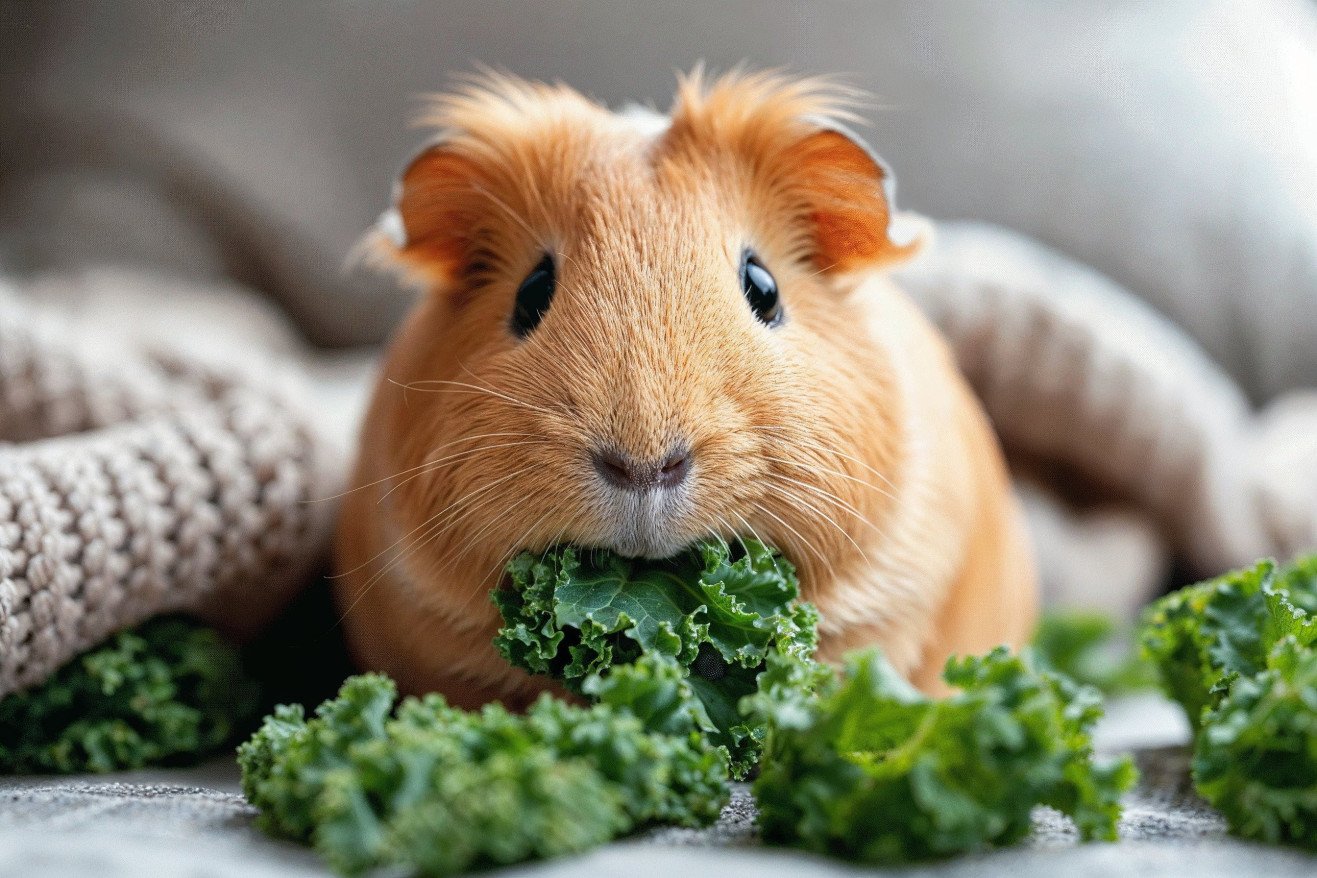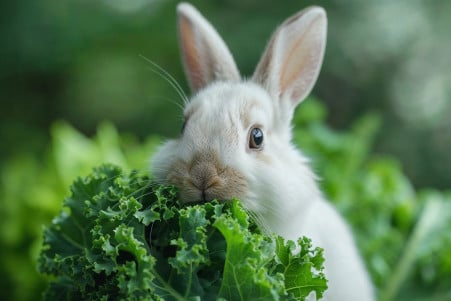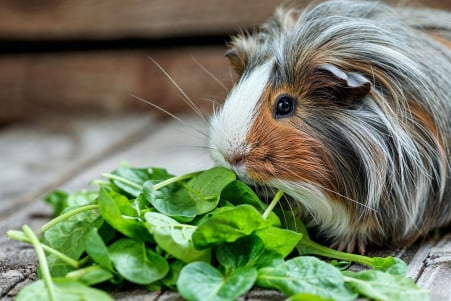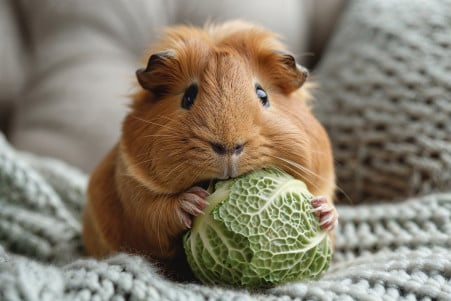Can Guinea Pigs Eat Kale? Balancing Nutrition and Risks
24 January 2024 • Updated 28 January 2024

Doubts about whether or not kale is a good food for guinea pigs stem from the fact that it is a nutritional powerhouse. While guinea pigs can eat kale, it should be fed in moderation because of its high calcium levels, which can contribute to bladder stones. It should also be introduced slowly and fed in combination with other vegetables to ensure that your pet gets a well-rounded diet.
This article will review research from veterinary nutrition, animal science, and small animal care to help you determine whether or not kale should be part of your guinea pig’s diet. We’ll look at how the nutritional content of kale compares to the dietary needs of guinea pigs, consider potential health concerns, and talk about the best ways to add this leafy green to your pet’s diet.
This information will help you better understand the facts so that you can decide whether or not to feed kale to your guinea pig.
Can guinea pigs eat kale?
How to Incorporate Kale’s Superfood Qualities into Your Guinea Pig’s Diet
Kale’s impressive nutritional makeup means that it can provide a number of benefits that can help improve the health of guinea pigs. For example, kale is a great source of important vitamins like A, C, and K.
Vitamin A, which guinea pigs can get from the beta-carotene in kale, is important for eye health and is necessary for night vision and color vision. Meanwhile, vitamin C is essential for guinea pigs, who can’t make it themselves, and kale has more of it than other leafy greens, which can help prevent scurvy, a common issue in guinea pigs, according to Healthline.
Kale’s high fiber content can also help improve guinea pigs’ digestive health, which is important for their well-rounded diet. And, unlike many fruits, kale is low in sugar, which means it’s a good vegetable option for guinea pigs because it won’t add extra calories that could lead to obesity, according to Medical News Today.
Finally, kale is full of antioxidants and phytonutrients like lutein and zeaxanthin, which can help fight oxidative stress and may lead to long-term health benefits for guinea pigs, including better heart health and a reduced risk of cancer, according to Nutrition and You. All of these things mean that kale can be a great addition to a guinea pig’s diet if it’s fed in the right way.
Everything in Moderation: Risks of Feeding Guinea Pigs Kale
While kale can be a healthy part of a guinea pig’s diet, it’s important to understand the potential health risks of overfeeding. For example, guinea pigs that are fed too much kale, which contains 254 mg of calcium per 100g according to Guinea Piggles, can develop bladder stones, a painful condition that can lead to urinary tract infections and other health problems if not treated.
Another risk is vitamin A toxicity. According to GuineaDad, kale contains 3.23 IU of Vitamin A per 100g serving, which is important for organ and eye health. However, if guinea pigs are fed too much kale, they can develop dry, scaly skin and other issues, so it’s important to make sure they don’t eat too much.
In addition, despite popular belief, kale is low in oxalates, with only about 20 milligrams per 100-gram serving according to Heal With Food, which cites USDA data. This is much lower than spinach, so the risk of oxalate-related health problems, such as calcium oxalate stones, is lower.
To avoid these issues, it’s important to practice responsible feeding, which means feeding guinea pigs in moderation and with a variety of foods. By feeding guinea pigs kale in moderation and watching for any signs of problems, you can make sure your guinea pig enjoys the benefits of this leafy green without any health risks.
How to Feed Kale to Your Guinea Pig
You can feed your guinea pig kale, but you should do so in a way that is mindful of their health. You can start by giving them a small piece of kale mixed in with their other greens and then gradually increase the amount of kale you give them.
According to GuineaDad, you should start with a small amount and see how your guinea pig reacts before making it a regular part of their diet. The RSPCA also notes that you should introduce kale gradually because sudden changes in their diet can lead to digestive upset.
You should also make sure that you don’t give your guinea pig more than a cup of kale a day, as this will ensure that the kale is only a part of the mixed vegetables you give them, according to Guinea Piggles.
You should also make sure to monitor your guinea pig for any changes in their reaction to new foods, changes in their eating or bathroom habits, and consult a vet if you have any concerns.
Make sure to mix the kale with a variety of other vegetables to make sure that your guinea pig is getting a well-rounded diet.
According to GuineaPiggles, you should also make sure to give your guinea pig a variety of vegetables to make sure that they don’t get bored and lose interest in their food. As you continue to feed your guinea pig kale, you should also make sure to monitor their health and the nutrients that they are getting to make sure that they are getting the right nutrients for a guinea pig’s overall nutritional needs.
How to Create a Balanced Diet for Guinea Pigs: The Role of Kale
Knowing what guinea pigs need in their diet is important for their health. A diet high in fiber is a must, and hay is the foundation of that, providing the fiber that guinea pigs need for healthy digestion. Supreme Petfoods also points out that guinea pigs are natural grazers and need a diet that is based on grass to help keep their teeth from overgrowing and to support their unique digestive system.
Guinea Pig Magazine explains that guinea pigs need to get vitamin C from their diet because they can’t make it themselves. Since kale is high in vitamin C, it can help guinea pigs get the vitamin C they need if it’s fed in moderation.
It’s also important to make sure that guinea pigs have a varied diet. Adding other vegetables to kale can help make sure that guinea pigs get the nutrients they need and keep them interested in their food, according to zooplus Magazine.
However, guinea pig owners need to be careful when they introduce new foods to their pets since their digestive systems are delicate and sudden changes can cause problems. However, by watching what they eat and their poop, guinea pig owners can make sure that their pets are healthy.
This kind of attention to detail in their diet is part of responsible pet ownership and will help make sure that guinea pigs are happy and healthy.
Conclusion: Can Guinea Pigs Eat Kale?
In conclusion, kale can be a healthy part of your guinea pig’s diet if it is fed in moderation. The vitamins A and C and antioxidants in kale can help keep your guinea pig healthy.
However, the key to getting these benefits while minimizing the risks is to feed kale in moderation. Be sure to watch how much kale you feed your guinea pig to avoid problems like bladder stones, which can be caused by the calcium in kale.
It’s also important to make sure that you are feeding your guinea pig a balanced diet. Kale should be fed as part of a variety of vegetables and in addition to a high-fiber hay. Also, make sure to watch your guinea pig’s reaction to new foods and talk to your vet if you have any concerns about your guinea pig’s diet.
Being a good pet owner means making sure that you are making the best choices for your pet’s diet. If you do it right, feeding your guinea pig kale can help them live a long and healthy life.


